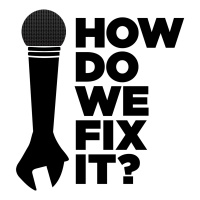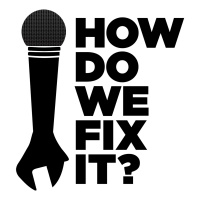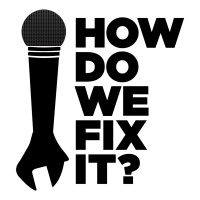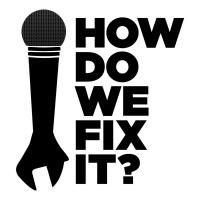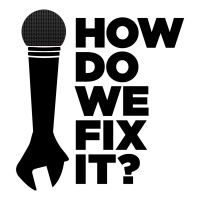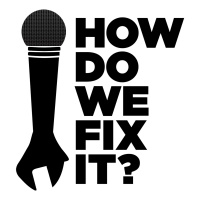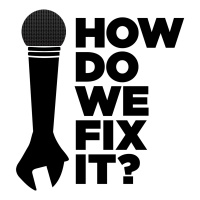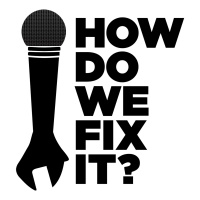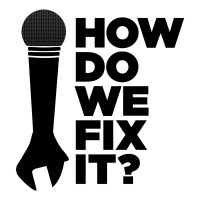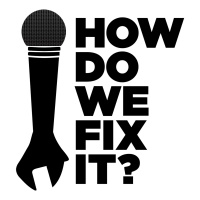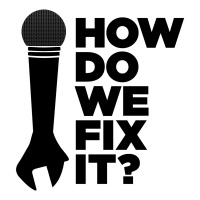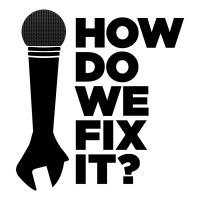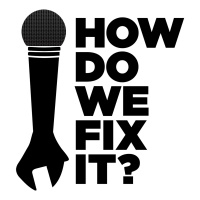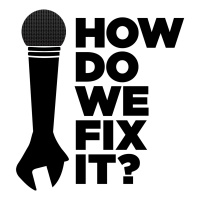How Do We Fix It?
- Autor: Vários
- Narrador: Vários
- Editor: Podcast
- Duración: 182:45:16
- Mas informaciones
Informações:
Sinopsis
From politics to the personal, we're about solutions. Our weekly podcast features two friends and longtime journalists. Join Richard Davies (ABC News) and Jim Meigs (Popular Mechanics) as they challenge authors, experts and provocateurs in a search for positive, practical ideas. Guests include Alan Dershowitz, a noted legal scholar and defender of civil liberties; Mike Rowe of "Dirty Jobs" and Lenore Skenazy, founder of "Free Range Kids." Topics include politics, parenting, personal finance, human behavior and much more. "How Do We Fix It?" - a repair manual for the real world. Produced by DaviesContent
Episodios
-
Our Journalism Crisis: A Conversation
31/01/2019 Duración: 24minThe public's faith in journalism is at the lowest point in living memory. A recent Gallup poll for the Knight Foundation found that most U.S. adults said they personally have lost trust in the news media in recent years. More than 9 in 10 Republicans feel this way. The recent uproar over the rush to judgement and media coverage of the Covington Catholic story is the latest damaging controversy. “Boys in Make America Great Again Hats Mob Native Elder at Indigenous Peoples March,” was the first New York Times headline about what happened. But by the next day a much more complex picture began to emerge of what had happened. "The weekend began to take a long, bad turn for respected news outlets and righteous celebrities," wrote Caitlin Flanagan in a long and thoughtful analysis in The Atlantic about why the media "botched" the story.The news business is also reeling from years of job losses and budget cuts. Newsrooms at many local and regional newspapers have been
-
Our Government Crisis: Philip K. HowardUntitled Episode
25/01/2019 Duración: 25minThe longest-ever federal government shutdown and the flawed Presidency of Donald Trump are symptoms of something far deeper: Dysfunction in Washington.In this episode, Philip K. Howard attacks the failed ideologies of Republicans and Democrats, and calls for a radical simplification of government to re-empower Americans in their daily choices. Americans are a practical people, he says. They want government to be practical."Unfortunately, we got this idea in the 1960's that we could solve the problems of human fallibility by just telling everybody how to do everything," Philip tells us. "Rules are the ultimate dictator, and even worse, you can't yell at them."For more than a decade, Philip has been campaigning for a government that works. He is an expert on the effects of modern law and bureaucracy on human behavior. Philip is the author of several books, including the best-seller “The Death of Common Sense: How Law Is Suffocating America” and, “Try Common Sense: Replacing Failed Ideol
-
A Cure for Massive Violence: Rachel Kleinfeld
17/01/2019 Duración: 32minThe terrible bloodshed in Syria, Yemen, and other countries at war capture global headlines. But the vast majority of killings in countries around the world are neither the result of warfare nor terrorism. Homicides by gangs, organized crime groups, paramilitary death squads, and ordinary people are the most common cause of violent deaths. More people have died in Mexico in recent years than in Iraq and Afghanistan combined. Murder rates in four U.S. cities are higher than in Latin American centers known for their past violence. Rachel Kleinfeld, a senior fellow in the Democracy, Conflict and Governance Program at the Carnegie Endowment for International Peace is our guest in this episode. Her new book, "A Savage Order: How the World's Deadliest Countries Can Forge a Path to Security", is an urgent look at how many countries, once overwhelmed by massive violence, have since recovered.What are the specific steps needed to reduce the hugely uneven impact of "privilege violence?"&nb
-
The Fight to End Gerrymandering: Katie Fahey
10/01/2019 Duración: 26minWith a simple Facebook post saying that she wanted to end partisan gerrymandering, Katie Fahey sparked the beginnings of an extraordinary grassroots campaign. Katie is in her late 20's. With neither connections nor deep pockets, she started Voters Not Politicians to change Michigan's State Constitution. Hundreds of thousands of signatures were collected,. The movement pulled off a remarkable feat, winning a ballot measure that will create an independent citizen commission to decide the shape of congressional and state legislature districts. The goal was simple: voters - not politicians or lobbyists - would compromise and draw electoral maps that cannot favor one party or candidate. When the campaign needed money to print petitions and organize meetings, volunteers asked family and friends to contribute. See acast.com/privacy for privacy and opt-out information.
-
8 For ‘18. The Year’s Big Lessons
28/12/2018 Duración: 24minIn a year of crazy politics, disdain for the views of experts, and deep partisan divisions, we look beyond anger and fear stoked by cable TV, talk radio and social media to learn eight deeper lessons of where we are today and in what direction we are headed.Here are the eight “Fix It” takeaways as we head into 2019. Warning: Some are hopeful!1. “Women just aren’t going to take it anymore.” We discuss the growing power of women in politics, entertainment and hear why workplace programs to stop the widespread crisis of sexual harassment could be so much better than most initiatives are today. 2. “Debt is back in a big, bad way. Why the debate over rising federal deficits and the nation’s debt mountain will grow in 2019. 3. “The economy slows down and financial worries heat up.”As Wall Street volatility returns, reporter and author Diana Henriques tells us what new financial protections are needed to prevent a future meltdown.4. “Don’t count capitalism out.” We pushback against
-
The Power of Reading: Professor Joesph Luzzi
21/12/2018 Duración: 23minAmerica is facing a reading crisis. According to a government survey the number of adults who read for pleasure has fallen by more than 30% in less than 15 years. Another recent study found that Americans watch an average of three hours of TV a day, compared to less than half-an-hour spent reading."Reading is seeing the world through someone else's eyes", says Professor Joseph Luzzi of Bard College , our guest in this episode. "Social media is a mirror," says Joseph. "You look into it and your tastes and interests are reflected back on you. Literature is a prism. You look into it and you are engaged, as Virginia Wolfe said, with the mind of someone else."The decline in reading and the popularity of social media may have profound impacts on democracy, feeding into our deep partisan division, and reinforcing extreme opinions.We discuss how reading Dante helped save Joseph after he became a widower and a father on the same day. We also learn about his 4-for-45 prescri
-
China: The Challenge & Threat: Elizabeth Economy
13/12/2018 Duración: 26minThe high stakes show-down between the U.S. and China on tariffs, trade and cyber security threatens to disrupt the global economy. Growing tensions were temporarily put on pause during a recent meeting at the Group of 20 summit between President Trump and China's leader Xi Jinping. But many long-term challenges remain. Relations with China are the most important foreign policy issue.The Trump Administration imposed tariffs on $250 billion of Chinese goods and has pushed back against China's trade policies and aggressive attempts to exploit U.S. technology to boost its own economy. Under Xi, China has reversed a three-decade trend towards greater political and economic opening. In this episode we look at how the U.S. and the West should deal with a more assertive, confident and anti-democratic China. Our guest is the respected scholar, Elizabeth Economy, Director for Asia Studies at The Council on Foreign Relations and the author of the highly praised book, "The Third Revolut
-
Our Many Perception Gaps: Sam Laine Perfas
07/12/2018 Duración: 28minWhat you think is true doesn't necessarily line up with reality. From the heated debate over gun violence deaths to our views about violent crime and global poverty, many of us have serious perception gaps. Democracy can be damaged when public opinion is out-of-step with the facts.The opioid epidemic is often in the headlines and was recently declared a public health emergency. But did you know there's another substance that kills far more people every year? Another example: massacres at schools, malls and other public places get massive media coverage, but they account for a tiny percentage of gun deaths.Our guest in this episode is Samantha Laine Perfas, host of the new podcast series, "Perception Gaps". She tells us "there are things we perceive to be true that are simply not. And challenging us to think about these misperceptions... begins to peel back the layers of why we believe what we believe."We hear fascinating and deeply personal stories from several recent guests on "Perception
-
Has The Opioid Crisis Peaked? Sam Quinones
28/11/2018 Duración: 22minThe opioid and heroin epidemic has caused massive destruction suffering and pain. After rising for many decades, America’s life expectancy rate has dropped for the past two years in a row. Nearly 50 thousand Americans last year were the victims of opioid overdose deaths--twice the rate of other wealthy nations.But now, because of impressive initiatives to tackle the crisis, there are small glimmers of hope. The death-rate might be starting to fall. This month, a New York Times report highlighted a plunge in fatal overdoses in Dayton, Ohio, which had one of the highest rates in 2017.Among the possible solutions we hear about is GROW, a local effort that dispatches teams of social workers, medics, police officers and recovery experts to the homes of people who've overdosed. We also discuss the FDA's approval of the controversial synthetic opioid, Dsuvia, to treat cases of extreme pain, and the recent passage of a bipartisan bill to fight the
-
AI Will Change All of US: Kai-Fu Lee
23/11/2018 Duración: 20minArtificial intelligence will lead to sweeping changes in our society, economy and relationship with work. China has suddenly caught up with The United States and will exercise much greater technological power in the future."We will not have to do routine jobs anymore," says our guest, Kai-Fu-Lee. "AI will take over in the next 15 to 20 years all the routine jobs that we have and work efficiently and essentially for free and 24/7 with no complaints."This creates both daunting and exciting challenges for our future, argues Dr. Lee, who is one of the world's leading AI experts. He has been in AI research, development and investment for more than thirty years.His new book is "AI Super-Powers: China, Silicon Valley and The New York Order."We discuss deep learning and how AI can learn things by itself, recognizing faces, speech and patterns. Artificial can do sophisticated customer service, telemarketing, loan approvals and many forms of blue-collar work such as dishwashing, fruit picking and as
-
Thanks a Thousand. Gratitude: A.J. Jacobs
15/11/2018 Duración: 25minJust in time for Thanksgiving, we speak with best-selling author and "immersive journalist" A.J. Jacobs about his extraordinary gratitude project and brand new book, "Thanks a Thousand".He decided to say "thank you" to every single person involved in producing his morning cup of coffee. "It turned out to be thousands of people," A.J. tells us. "I thanked the barista, the lid designer and the coffee bean farmer, but also the truck driver who delivered the beans. The idea is to show the interdependence and interconnectivity of our world."We hear useful insights about gratitude, including tips that can be helpful and fun at Thanksgiving Day gatherings. This episode is a joint "simul-pod" with our friends at "Half Hour of Heterodoxy" podcast. Deb Mashek, Executive Director of the Heterodox Academy is the co-host along with Richard and Jim. In our confrontational and troubled times, this episode is a reminder that cooperation plays a vital role in many of the most basic human rit
-
Election Special: Our Take
08/11/2018 Duración: 20minWhat are the most inspiring, exasperating, unique, important, and first-in-our-lifetime results from the Midterm Elections? In this special edition, Jim and Richard give their Quick Fixes take on how American voted.We discuss: Donald Trump's turnout gift, why the economy played a far larger role than election analysts admit; the serious problems that now face both Republicans and Democrats, the insidious impact of gerrymandering, how celebrities failed to motivate voters, and why the handwringing about money in politics has been put on hold for now.From Glenn Reynolds' view that the result was more of a purple puddle than a blue wave, to why the year of the woman shattered fund-raising and attention-getting glass ceilings, this record-setting election can be interpreted in a variety of interesting ways.As for what's next? Jim and Richard discuss the power of small solutions and why the new Congress must focus on legislation as well as investigations. See acas
-
Title: Bridging Divide. ReCity. Durham, North Carolina
01/11/2018 Duración: 30minHow can America recover from hatred, distrust and resentment that have lead to deep divisions, the fraying of our civic institutions and even violence, such as the recent Pittsburgh synagogue shooting?This episode, recorded at ReCity in Durham, North Carolina, is the third in our renewing democracy podcasts, where we report on collaborative efforts to promote respect and bridge divides.The idea behind this series is that if we’re going to pull back from the political precipice, it’s going to come first locally, not nationally. We’ve seen what hate and fear and can do, perhaps it’s time to try love, or at least tolerance. ReCity is a shared office space-- similar to a We Works for dozens of local social action non-profits and companies-- where organizations are housed in an open-plan office under one roof. We look at how their hard work can bring people together and lead to social change. "I believe there is hope for our communities, but when you turn on the news right n
-
Bridging Divide Renewing Democracy: Minnesota
26/10/2018 Duración: 30minPolarization is tearing us apart. Bullying and bluster are two of the most common ingredients in American democracy.How can we renew democracy and restore the sort of trust that is essential for governance? This episode looks at the constructive and energetic responses of two local and national groups in Minnesota.We visit a Living Room Conversation discussion on race at Minneapolis Community and Technical College, and speak with the co-founder of Better Angels, Bill Doherty, a University of Minnesota Professor, who is working with others to bridge partisan divides.We also meet Tiffany Wilson-Worsley, a family and community specialist in Minneapolis, who works as a facilitator for discussions on race relations."We have this pervasive need to be human with one another," she says. "There are so many divides, and I think the goal is to bring us all together to get to know one another, but also to grow together."Both groups promote guided conversations in a safe space, and estab
-
Bridging Divide: Iowa Civility Workshop
18/10/2018 Duración: 24minAmerican democracy is in crisis and politics have become weaponized with name calling and personal attacks. Trust in national institutions and the media is at an all-time low. Congress and The Supreme Court are much more likely than in the past to cast predictable party-line votes. As a nation we are failing to make creative solutions, based on compromise.This episode is the first of three to report on local efforts that push back against the toxic impact of tribalization and political polarization. "This is not just a shake our fists at what Donald Trump has brought to our national discourse," Kathie Obradovich, Opinion editor at The Des Moines Register, tells us. "It goes deeper to our ability to speak to and understand each other.""People who used to put party politics aside and work for common interests are just fewer and fewer. The number of prominent moderates in Iowa politics I can count on one hand."In this episode, we report on the work of Revive Civility Iowa,
-
Bridging Divide. Renewing Democracy: Carolyn Lukensmeyer
11/10/2018 Duración: 22minNever before in living memory has America been so deeply divided, and this paralysis threatens to weaken and corrode democracy. Ideological silos have become much more common among both conservatives and liberals.One opinion poll says 7 in 10 Americans believe that our politics have reached a dangerous low point. And most say the climate is a new normal— not temporary.This is the first of four “How Do We Fix It?” episodes leading up to the Midterm Elections that discuss local and national attempts to push back against political dysfunction and the lack of rational, respectful debate. Forthcoming episodes will report on new initiatives in Iowa, Minnesota and North Carolina.Carolyn Lukensmeyer, is a leader in the field of deliberative democracy and social entrepreneurship she is the Executive Director of the National Institute for Civil Discourse.“Voters are frustrated, worried, and angry with their leaders and ashamed of how our political process works these days. Heated rhetoric and a dramatic shift away from
-
Lessons from Reagan: Bob Spitz
04/10/2018 Duración: 29minAt a time of fractured politics and failed leadership, what lessons can be learned from Ronald Reagan-- one of the most significant presidents in our history?Considered a dangerous outsider by critics when he was elected in 1980, he appeared to be enthralled with happy endings and disinterested in many of the finer details of economic and social policy. And yet America's fortieth president presided over an economic boom and successful peace talks with the Soviet Union that helped lead to the end of the Cold War.Our guest, best-selling biographer Bob Spitz, is the author of "Reagan: An American Journey", a richly detailed, riveting, and carefully balanced account of a remarkable life. The book looks clearly at Reagan's policy failures on AIDS, Iran-Contra and Star Wars missile defense, as well as his achievements and great skill as a communicator. "Reagan came to power at a very important time in our history," Bob tells us. "We had come through the Vietnam War, Watergate, a succession of failed presi
-
Fighting Back Against Fake News: Steven Brill
27/09/2018 Duración: 24minA recent poll finds that two-thirds of Americans often or occasionally get news from social media. But many consumers are highly skeptical of the information they see on Facebook and other sites, expecting it to be "largely inaccurate."Now a new company, Newsguard, uses journalism to fight the epidemic of false stories, misinformation and outright propaganda, helping readers to navigate through online news sites. Newsguard's web browser extension rates websites that appear in searches on their reliability. The easy-to-use plug-in includes a red-green symbol that shows if a site is trying to get it right or instead has a hidden agenda. "We apply common sense to a problem that algorithms haven't been able to resolve," says Newguard's co-CEO, Steven Brill. During an extraordinary career as a journalist, author and business executive, Steven was founder of Court TV, The American Lawyer Magazine, Brill's Content Magazine, and The Yale Journalism Initiative. Now, his latest p
-
Identity Politics: Dignity and Resentment. Francis Fukuyama
20/09/2018 Duración: 29minAre identity politics ruining democracy? National and global institutions are in a state of decay, and identity fuels much of today's debates in America and across the world. On the right, Donald Trump seized on the grievances and resentment of white working class voters and others who felt let down by the impact of globalism and technology. On the left, social and political movements based on gender, sexual identity, race and ethnicity play an increasingly large role. "The problem with our politics is that we have shifted from arguing about economic policies to arguing about identities," says our guest, political scientist, Francis Fukuyama. In his new book, "Identity: The Demand for Dignity and The Politics of Resentment," he warns that unless we forge a universal understanding of human dignity, we will doom ourselves to continual conflict. In the United States, “it’s better if both parties actually stick to broad social policy issues that they can argue about, rather than lini
-
Collaboration Beats Competition: Paul Skinner
14/09/2018 Duración: 24minIn recent decades, business strategy has been built on the idea that we must compete to win.But what if the competitive model of business is now broken? In today’s interconnected, digital world, strategies to create competitive advantage may be holding us back— with a negative impact on the workplace and the economy.In his new book “Collaborative Advantage: How Collaboration Beats Competition as a Strategy for Success". British marketing and business consultant Paul Skinner presents Collaborative Advantage as a radical alternative to the conventional goal of Competitive Advantage. Skinner says: "We can be more ambitious in the way we grow our businesses, increase the impact of our non-profits and find better solutions to our most pressing problems when we view our opportunities through the lens of cooperation rather than competition."This episode explores:How Competitive Advantage can overshadow human purpose and the capacity for cooperation in businesses and other


